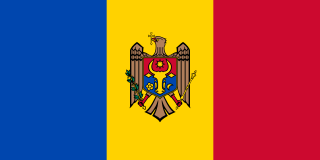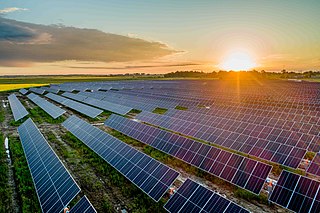Related Research Articles

The economy of Moldova is an emerging upper-middle income economy, Moldova is a landlocked Eastern European country, bordered by Ukraine on the East and Romania to the West. It is a former Soviet republic and today a candidate member to the European Union.

Moldova, officially the Republic of Moldova, is a landlocked country in Eastern Europe, on the northeastern corner of the Balkans. The country spans a total of 33,483 km2 (12,928 sq mi) and has a population of approximately 2.42 million as of January 2024. Moldova is bordered by Romania to the west and Ukraine to the north, east, and south. The unrecognised breakaway state of Transnistria lies across the Dniester river on the country's eastern border with Ukraine. Moldova is a unitary parliamentary representative democratic republic with its capital in Chișinău, the country's largest city and main cultural and commercial centre.
Moldovan or Moldavian is one of the two local names for the Romanian language in Moldova. Moldovan was declared the official language of Moldova in Article 13 of the constitution adopted in 1994, while the 1991 Declaration of Independence of Moldova used the name Romanian. In 2003, the Moldovan parliament adopted a law defining Moldovan and Romanian as glottonyms for the same language. In 2013, the Constitutional Court of Moldova interpreted that Article 13 of the constitution is superseded by the Declaration of Independence, thus giving official status to the name Romanian. The breakaway region of Transnistria continues to recognize "Moldavian" as one of its official languages, alongside Russian and Ukrainian. Ukraine also continued until recently to make a distinction between Moldovan and Romanian, with one village declaring its language to be Romanian and another declaring it to be Moldovan, though Ukrainian officials have announced an intention to remove the legal status of Moldovan. On 16 November 2023, the Ministry of Education and Science of the Ukrainian government stated that it has initiated steps to abolish the Moldovan language and to replace it with Romanian. On 13 January 2024, Ukrainian newspaper Dumska reported that the Ukrainian Ministry of Education and Science had announced all 16 schools in Odesa Oblast teaching "Moldovan" had dropped the term in favor of Romanian. On 16 March 2023, the Moldovan Parliament approved a law on referring to the national language as Romanian in all legislative texts and the constitution. On 22 March, the president of Moldova, Maia Sandu, promulgated the law.

Transnistria, officially known as the Pridnestrovian Moldavian Republic and locally as Pridnestrovie, is a landlocked breakaway state internationally recognized as part of Moldova. It controls most of the narrow strip of land between the Dniester river and the Moldova–Ukraine border, as well as some land on the other side of the river's bank. Its capital and largest city is Tiraspol. Transnistria is officially designated by the Republic of Moldova as the Administrative-Territorial Units of the Left Bank of the Dniester or as Stînga Nistrului.

The ȘOR Party was a pro-Russian populist political party in Moldova. Known from its foundation in 1998 until October 2016 as the Socio-Political Movement "Equality", the party held Eurosceptic and Russophilic stances.
OMV Petrom S.A. is a Romanian integrated oil company, controlled by Austria's OMV. It is one of the largest corporations in Romania and the largest oil and gas producer in Southeast Europe. Since 2004 it is a subsidiary of OMV. With 2022 profits of EUR 12.5 billion, as of 2023, OMV Petrom is the largest company in Romania.

Russia's energy policy is presented in the government's Energy Strategy document, first approved in 2000, which sets out the government's policy to 2020. The Energy Strategy outlines several key priorities: increased energy efficiency, reducing the impact on the environment, sustainable development, energy development and technological development, as well as improved effectiveness and competitiveness. Russia's greenhouse gas emissions are large because of its energy policy. Russia is rich in natural energy resources and is one of the world's energy superpowers. Russia is the world's leading net energy exporter, and was a major supplier to the European Union until the Russian invasion of Ukraine. Russia has signed and ratified the Kyoto Protocol and Paris Agreement. Numerous scholars posit that Russia uses its energy exports as a foreign policy instrument towards other countries.

The gas-fired Cuciurgan power station, the largest power station in Moldova, is located in Transnistria, on the shores of the Cuciurgan Reservoir bordering Ukraine. As of 2024 it generates over three quarters of Moldova's electricity. Commissioned in 1964, it formerly burned some coal and fuel oil.

Energy in Romania describes energy and electricity production, consumption and import in Romania.

Moldova–Russia relations are the bilateral relations between the Republic of Moldova and the Russian Federation, two Eastern European, post-Soviet, ex-communist countries. Russian support for the self-proclaimed Pridnestrovian Moldavian Republic (Transnistria) and a substantial Russian military presence therein strained Moldovan relations with Russia.

Zinaida Greceanîi is a Moldovan politician. She was the President of the Moldovan Parliament between 8 June 2019 to 26 July 2021. Greceanîi was previously also the Prime Minister of Moldova from 31 March 2008 to 14 September 2009. She led the Party of Socialists of the Republic of Moldova (PSRM) from 2016 to 2020 and was previously a member of the Party of Communists of the Republic of Moldova (PCRM). She was Moldova's first female Prime Minister and was the second female Communist head of government in Europe, preceded only by Premier Milka Planinc of former Yugoslavia. She has been referred to by her colleagues in PSRM as the "Moldovan Margaret Thatcher".

Energy in Armenia is mostly from natural gas. Armenia has no proven reserves of oil or natural gas and currently imports most of its gas from Russia. The Iran-Armenia Natural Gas Pipeline has the capacity to equal imports from Russia.

Russia supplies a significant volume of fossil fuels to other European countries. In 2021, it was the largest exporter of oil and natural gas to the European Union, (90%) and 40% of gas consumed in the EU came from Russia.

With few natural energy resources, Moldova imports almost all of its energy supplies. 50% of the country's national energy company, Moldovagaz, is owned by Russian oil and natural gas supplier Gazprom, the remaining 36% split between the Moldovan government (36.6%) and the unrecognised government of Transnistria (13.4%). Moldova's historic dependence on Russian energy is underscored by a debt of more than US$709 million to Gazprom as well as a further US$7 billion by Transnistria. Russia supplies the breakaway pro-Russian region with oil and natural gas without requiring them to pay, with the cost levied as debt against the Moldovan state as a form of economic warfare. The Moldovan government disputes the figures, and has identified more than US$100 million in fraudulent claims by Gazprom.

Energy consumption per person in Turkey is similar to the world average, and over 85 per cent is from fossil fuels. From 1990 to 2017 annual primary energy supply tripled, but then remained constant to 2019. In 2019, Turkey's primary energy supply included around 30 per cent oil, 30 per cent coal, and 25 per cent gas. These fossil fuels contribute to Turkey's air pollution and its above average greenhouse gas emissions. Turkey mines its own lignite but imports three-quarters of its energy, including half the coal and almost all the oil and gas it requires, and its energy policy prioritises reducing imports.

Lithuania is a net energy importer. In 2019 Lithuania used around 11.4 TWh of electricity after producing just 3.6 TWh.

Maia Sandu is a Moldovan politician who has been president of Moldova since 24 December 2020. She is the founder and former leader of the Party of Action and Solidarity and was prime minister of Moldova from 8 June 2019 until 14 November 2019, when her government collapsed after a vote of no-confidence. Sandu was minister of education from 2012 to 2015 and member of the parliament of Moldova from 2014 to 2015, and again in 2019.

Natural gas supplies over a quarter of Turkey's energy. The country consumes 50 to 60 billion cubic metres of this natural gas each year, nearly all of which is imported. A large gas field in the Black Sea however started production in 2023.
The energy crisis in Moldova is part of the global energy crisis of 2021-2023 that began after the coronavirus pandemic in 2021, when the Republic of Moldova faced record price increases and artificial shortages of gas, oil, and electricity. It was triggered by a number of economic factors and the gas disputes with the Russian Federation, which escalated into political pressure on Moldova after Russia's invasion of Ukraine.

On 31 December 2024, at 19:50 EET, Moldova's unrecognized breakaway region of Transnistria stopped receiving natural gas supplies from Russia when Ukraine's gas transit deal with Russia expired. Historically, Transnistria had covered most of Moldova's electricity needs through the Cuciurgan power station, which functioned with Russian gas supplied to Transnistria for free. However, with the termination of Russian gas supplies to Transnistria and the end of Moldovan purchases of Transnistrian electricity, the possibility of a humanitarian crisis in Transnistria has arisen, which could potentially lead to the collapse of the breakaway state and its reintegration into Moldova. Three people have died in Transnistria since the start of the energy crisis due to carbon monoxide poisoning.
References
- ↑ Muntean, Ion (10 March 2020). "The perpetuation of formalistic electricity procurement practices amplifies the security threats facing the country and undermines the development of the electrical energy sector" (PDF). Bulletin. Power, Politics & Policy (6). Institute for Development and Social Initiatives "Viitorul": 2.
- ↑ "Premier Energy susține că nu a semnat niciun contract privind achiziția energiei electrice: "Au prezentat oferte trei furnizori, însă compania de stat "Energocom SA" nu a prezentat"". Ziarul de Gardă (in Romanian). 23 March 2021.
- 1 2 Conovali, Mihaela (1 November 2024). "Energocom a intrat în clasamentul celor mai mari 100 de companii din sud-estul Europei". NewsMaker (in Romanian).
- ↑ Całus, Kamil (20 February 2023). "More independence, less fear. Moldova's perspective on Russia after a year of war in Ukraine" (PDF). Centre for Eastern Studies. p. 2.